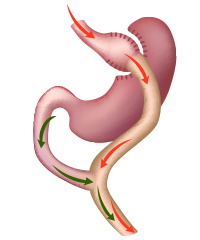Roux-en-Y Gastric Bypass Surgery
The Roux-en-Y gastric bypass is one of the more invasive weight loss surgeries. The Roux-en-Y gastric bypass has stood the test of time providing reliable, long-term weight loss with little long-term risk of malnutrition or complications.
 Roux-en-Y gastric bypass surgery works in three ways:
Roux-en-Y gastric bypass surgery works in three ways:
• By restricting the capacity of your stomach
• By reducing your appetite
• By bypassing part of the small intestine to minimise food and fat absorption
The function of the stomach is to digest food. This digested food passes through the stomach into the small bowel where the majority of nutrients and calories are absorbed. In Roux-en-Y gastric bypass surgery the stomach is made smaller by dividing it into a small upper pouch and a larger remnant pouch. The smaller pouch is then connected directly to the middle portion of the small intestine (jejunum) bypassing the rest of the stomach and the upper part of the small bowel (duodenum).
How is gastric bypass surgery performed?
The stomach is divided into a small upper pouch and a large lower pouch using surgical staplers which provide a seal between the two sections. A piece of the small bowel (jejunum) is then joined to the small stomach pouch bypassing the lower part of the stomach and the upper portion of the small bowel (duodenum).
The upper pouch is small so fills up quickly. The patient feels full and is unable to eat large volumes of food. The consumed food then passes directly to the middle part of the small intestine and through the rest of the digestive system. As the digestive system has effectively been made shorter, absorption of nutrients and calories is reduced.
Benefits of gastric bypass surgery
- More rapid initial weight loss compared to restrictive only procedures
- Perceived to offer patients a less restrictive diet
- Carried out using keyhole surgery leaving minimal scarring
- Helps create and maintain a feeling of fullness
- May produce “Dumping syndrome” in patients if they eat too many sweet or fatty foods on an empty stomach, which may result in nausea, queasiness, vomiting and diarrhoea. (This can be considered a benefit as it forces the patient into healthier food choices)
- Makes it easier to adopt changes to your eating habits and lifestyle
Is the gastric bypass surgery right for me?
There may be other medical reasons why surgery is not right for you. Our team will go through your medical history and the results of any tests you may have had prior to agreeing to proceed.
To qualify for the gastric bypass you must have tried to lose weight using conventional methods without long-term success and be:
- At least 18 years old
- Overweight with a Body Mass Index (BMI) above 40
- Overweight with a Body Mass Index (BMI) of 35 or above and suffer from an obesity-related health condition that poses a serious risk to your long term health (e.g. diabetes, high blood pressure, heart disease, etc)
- Not suffering from any other diseases that may have caused your obesity
- Willing to continue being monitored by the specialist treating you
- Ready to commit to long-term changes relating to eating patterns and exercise
How much weight could I expect to lose?
To learn more about this procedure contact us on 01753 665480.





